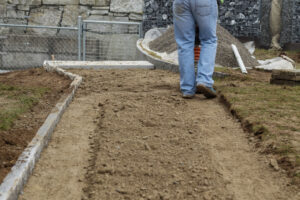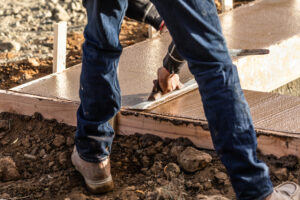If your pool is out of level, you’re likely dealing with problems like leaky and clogged pipes, uneven surfaces, and difficulty in managing the water level and chemicals. Fortunately, pool leveling is a simple and surprisingly affordable process that offers a slew of benefits. In this post, we’re taking a look at why pool leveling is a must and how you can level up your pool to perfection. So, get your DIY tools ready; it’s time to discover the top benefits of pool leveling!
What is Pool Leveling?
 Pool leveling is an important part of maintaining and keeping a pool in its best condition. For a pool to function correctly, it must be level in order to allow proper water and circulation flow, avoid wear and tear, and keep the edges of the pool from bulging or becoming too thin. Pool leveling involves using tools and techniques to ensure that your pool’s foundation is both standard and stable. You can get and advice from the best pool leveling contractor as well.
Pool leveling is an important part of maintaining and keeping a pool in its best condition. For a pool to function correctly, it must be level in order to allow proper water and circulation flow, avoid wear and tear, and keep the edges of the pool from bulging or becoming too thin. Pool leveling involves using tools and techniques to ensure that your pool’s foundation is both standard and stable. You can get and advice from the best pool leveling contractor as well.
The debate over whether leveling or grading should be used when constructing a pool depends on a number of factors. Leveling is often preferred for above-ground pools since they are not as likely to develop unstable movement due to shifting soil. Grading, meanwhile, can provide more stability for in-ground pools if properly done, since it adjusts for changes in soil conditions caused by weather or other natural phenomena. Ultimately, the decision between leveling and grading comes down to personal preference, since both techniques will offer benefits that positively affect a pool’s performance.
Pool leveling requires appropriate tools and techniques in order to achieve the desired results. In the next section, we explore the types of tools and techniques used for pool leveling and how effective they can be at creating a stable base for a pool.
- A properly leveled pool can ensure even circulation of water and prevents the pool from leaking.
- A pool that is properly leveled can help to reduce chemical usage, helping to reduce maintenance costs for those who own a pool.
- Research has shown that leveling a pool reduces the risk of structural damage and decreases the likelihood of bacteria growth by providing an even surface.
Tools and Techniques Used for Pool Leveling
 Tools and techniques used for pool leveling involve the process of using a variety of specialized equipment and testing instruments to ensure that all parts of the pool walls, floors, coping, steps, and other features are level, even, and safe. Depending on the job and size of the area being leveled, the task may require a combination of methods including laser guidance devices with precise readings, thin-set slab movers, bulldozers or grade/paver equipment operated by an experienced operator.
Tools and techniques used for pool leveling involve the process of using a variety of specialized equipment and testing instruments to ensure that all parts of the pool walls, floors, coping, steps, and other features are level, even, and safe. Depending on the job and size of the area being leveled, the task may require a combination of methods including laser guidance devices with precise readings, thin-set slab movers, bulldozers or grade/paver equipment operated by an experienced operator.
Laser guidance systems offer accurate measurements when it comes to pool leveling, allowing for more precise placement of materials and attainable surfaces. The use of thin-set slab movers is also commonly implemented for greater precision, which helps avoid time-consuming manual labor. In some cases, bulldozers or heavy grade/paver equipment may be necessary for larger areas, particularly when dealing with lawns where large amounts of dirt must be moved in order to re-level a sloped backyard and complete the job correctly.
The use of these tools and techniques can help overhaul your pool while creating minimal mess and disruption for you or your family. However, it is not without risks as incorrect use of any tool or technique could cause potential damage to the pool’s structure that could take longer to fix. It is best to leave any complex pool leveling tasks up to professionals in order to ensure safety while taking full advantage of any benefits that come with successful pool leveling.
The next section will discuss the top benefits of properly leveling a pool. Utilizing quality tools and techniques correctly during this process allows individuals to take full advantage of those benefits while avoiding common pitfalls.
What are the Benefits of Leveling a Pool?
Pool leveling is essential to optimal swimming pool performance and also to achieve a better aesthetic. When properly done, pool leveling can help with water distribution, reduce wear and tear on equipment, increase the lifespan of swimming pools, and ensure that no areas of the pool stay shallow or deep without reason.
The most obvious benefit of pool leveling is improved aesthetics. Pool leveling creates an even, level surface that can improve the look of any pool in the backyard. It gives the appearance of newness to the structure and helps create a uniform look throughout the entire area. This can be beneficial in enhancing curb appeal and making sure your home looks its best.
Moreover, there are benefits to pool owners as well. Properly leveled pools allow for more even water distribution throughout which in turn leads to improved filtration & circulation systems. With increased flow comes improved hygiene and when pool levels are corrected it is easier to clean the interior and keep it free from debris movement. In addition, more consistent levels add stress relief on all of the pool’s components such as pumps, filters and hoses thus improving their efficiency and reducing the chance of breakdowns or repairs over time.
Weighing both sides, it’s clear that if done correctly, pool leveling has many substantial benefits for visual appeal, consistent water distribution, component longevity and overall ease of maintenance for any swimming pool system.
Installation Costs for Pool Leveling
Pool leveling is a vital step to consider when setting up your swimming pool. The installation costs of pool leveling are driven by the size and shape of the pool, the type of soil being used, and other considerations like drainage. Some will argue that there are costs associated with do-it-yourself pool leveling that may range from modest to significant depending on the needed materials and labor. Conversely, many professionals who perform pool leveling services report that their fees are comparable to or only slightly higher than those required for DIY projects.
Regardless of whether you choose to go the DIY route or opt for professional services, it is important to remember that this is an investment in your pool’s maintenance and longevity. Doing it yourself may save in initial installation costs but could lead to higher long-term expenses related to any repair or correction work necessary due to inaccurate leveling or inadequate drainage.
With these points in mind, installation costs for proper pool leveling can range greatly, with higher-end projects costing thousands of dollars. Now armed with a better understanding of installation costs for pool leveling, let’s take a look at how properly maintaining a level pool can benefit you in the long run.
Maintaining a Level Pool
Maintaining a level pool is an important part of pool ownership and maintenance. By keeping the pool level, you can ensure that the environment around your pool remains safe and the water depth consistent when you do take a dip. In addition, by keeping your pool level, you can reduce strain on your pool’s equipment, decrease drainage problems, and even minimize potential water loss due to evaporation.
However, maintaining a level playing field isn’t without its challenges. Pool owners must monitor their pools’ conditions on a regular basis to make sure they stay level. Additionally, it seems like this task may become more difficult over time as the ground may shift under the pool in one area or another due to weather or other factors. And if minor adjustments to the pool’s surroundings aren’t made, eventually large adjustments such as re-leveling will be needed.
One of the best ways to achieve and maintain a level pool is with traditional leveling methods or laser leveling mtheods. Both have their advantages and disadvantages when it comes to achieving a perfectly even playing field around your swimming pool. In the next section, we’ll discuss the pros and cons of each approach and compare traditional leveling methods with laser leveling methods.
Comparing Traditional and Laser Leveling Methods
When evaluating methods for leveling a pool, owners have two main options: traditional methods and laser leveling. Traditional pool leveling involves a physical check to verify the level of the pool. This process can include the use of manual tools, such as a level, or a more advanced technique of using a water leveler tank. The measurements taken with either tool will provide an owner with the knowledge needed to determine whether there are any slopes or bumps that need addressing.
Conversely, laser leveling uses an automated system to measure the incline or decline of areas in the pool. This method is accurate and doesn’t require as much manual labor as traditional measures do; however, it can be costly to install and maintain. Additionally, it requires specialized tools and training to operate correctly – something that isn’t necessarily available at all locations. On the other hand, these tools can often take high-precision measurements in fewer steps than traditional methods, resulting in quicker and easier results.
In the end, it is up to the pool owner to decide which option is best suited for their project based on cost and effectiveness. Both options have their advantages and disadvantages that should be studied carefully before settling on one.
Conclusion
Pool leveling is one of the most important maintenance steps to ensure that your pool is safe and functioning optimally. Whether you’re dealing with an above-ground or in-ground pool, a level surface will help prevent accidents, damage to the pool structure, and even problems with water circulation. Not to mention it just looks better when the entire area is perfectly leveled.
On the other hand, there are potential downsides. If not done correctly and by trained professionals, leveling can cause additional damage that could be worse than what you started out with. In addition, inaccurate measurements can lead to problems down the road if not addressed at the time of installation.
So in conclusion, it’s clear that pool leveling is essential for many reasons – however it’s also important to note some of the potential drawbacks. To get the best results, find a qualified professional like H3O Water Systems who can accurately assess your pool’s current condition and provide exact measurements so they can level it correctly. With these steps in place, you’ll quickly see increased safety and performance from your pool. Contact us today for more information!

 Schedule An Estimate
Schedule An Estimate

